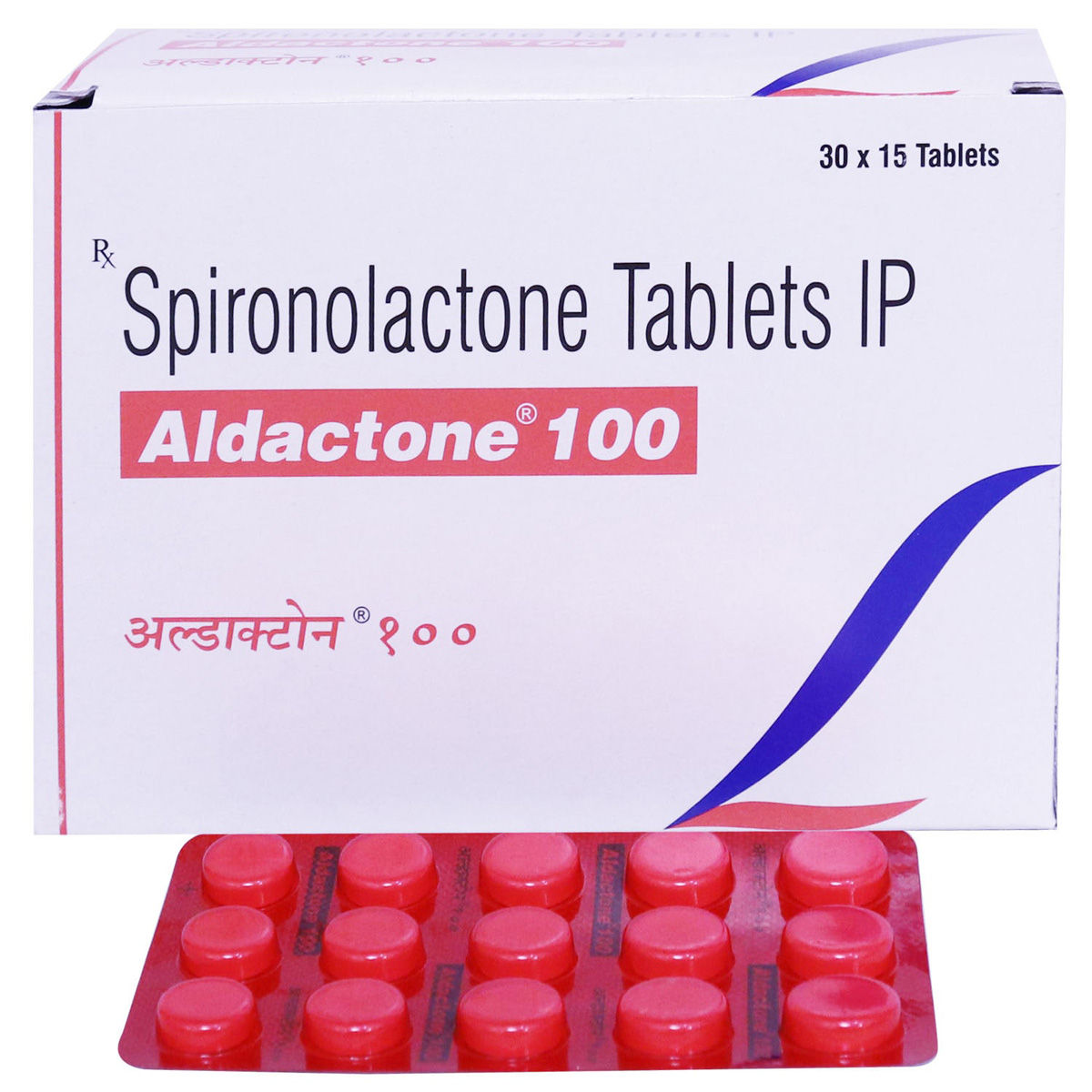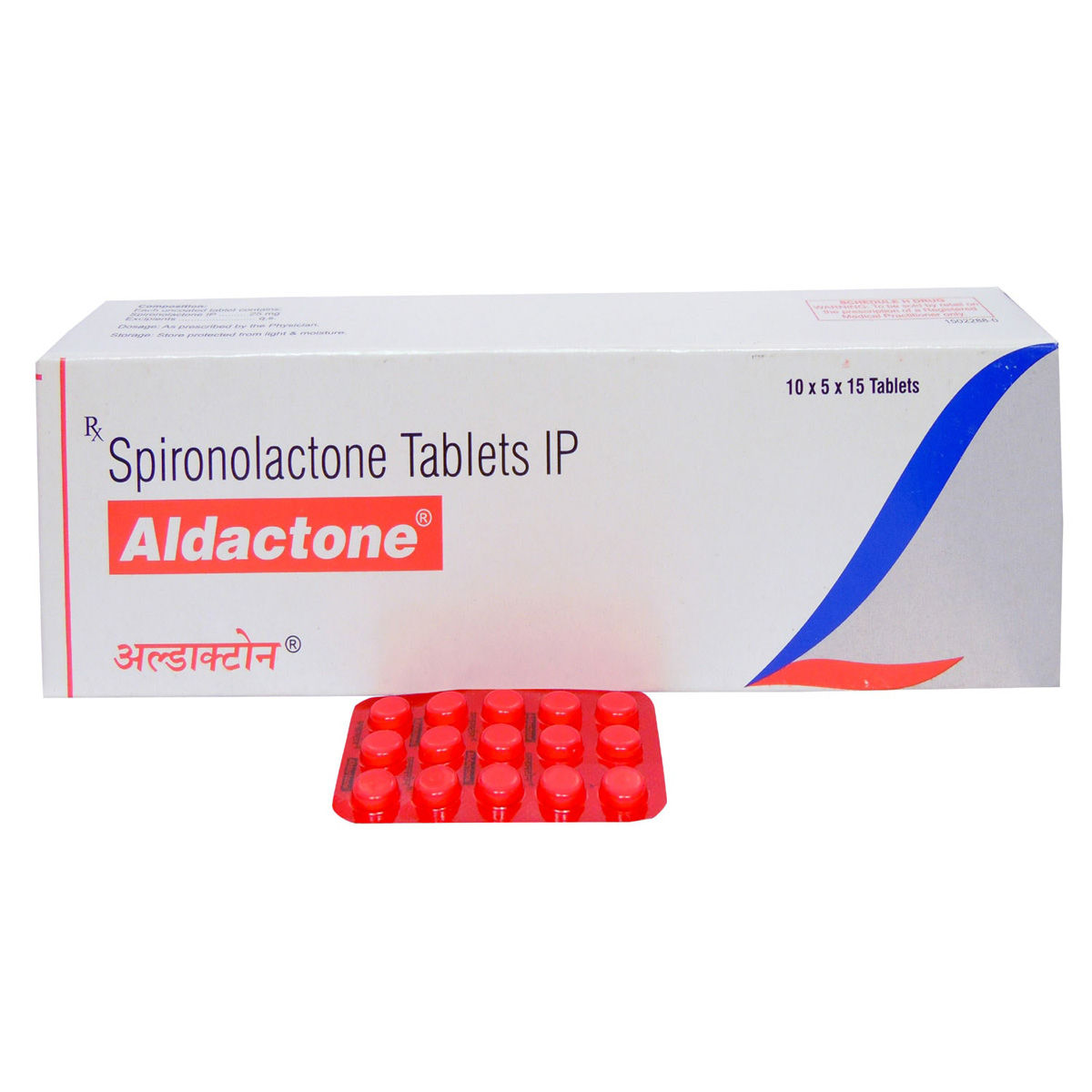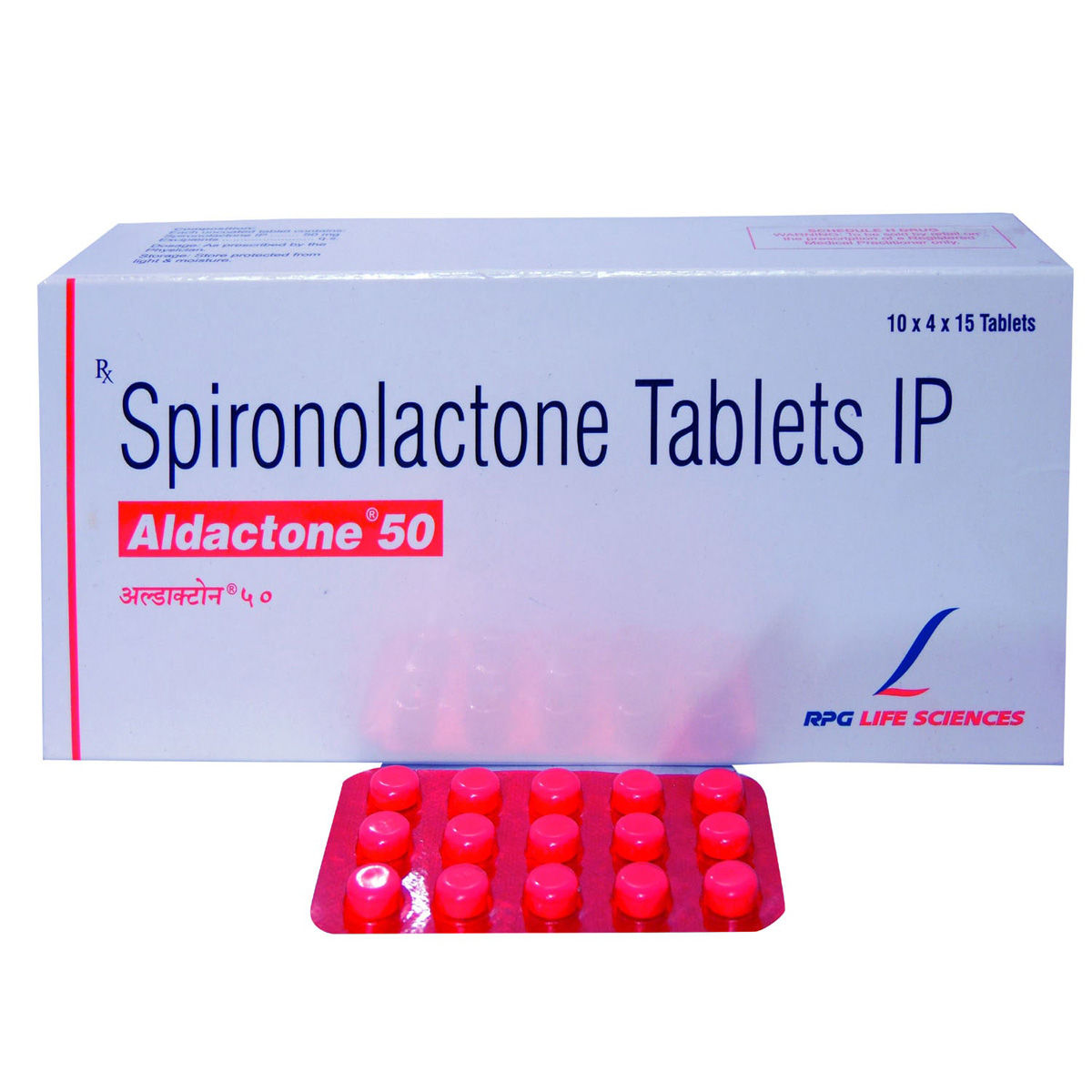Spironolactone
About Spironolactone
Spironolactone is used to treat oedema (fluid overload) associated with hepatic cirrhosis (chronic liver damage), congestive heart failure, and nephrotic syndrome (a kidney condition characterized by excessive protein loss in the urine). It is also effective in managing hypertension (high blood pressure), hypokalaemia (low blood potassium levels), primary hyperaldosteronism (a condition with excessive aldosterone hormone), and heart failure. Oedema is associated with pulmonary hypertension (high blood pressure in the lungs) or heart failure (irregular heart pumping). Leg swelling is the main characteristic of oedema, accompanied by shortness of breath, chest pain (angina), abnormal heart rhythms (arrhythmia), and swelling in the hands or abdomen.
Spironolactone contains spironolactone (a short-acting diuretic), which works by increasing the amount of urine that is passed out from the kidneys. It effectively reduces excess fluid levels in the body and treats oedema (swelling) associated with heart, liver, kidney, or lung disease. This reduces the heart's workload and makes the heart more efficient at pumping blood throughout the body. Thus, it helps lower high blood pressure, reducing the chances of heart attack, stroke, or angina (chest pain) in the future.
Your doctor will advise you how often you should take Spironolactone based on your medical condition. In some cases, Spironolactone may cause common side effects such as hypotension (low blood pressure), dehydration, drowsiness, dizziness, hyperkalaemia (high potassium levels), hyponatraemia (low sodium levels), elevated creatinine levels, headache, vomiting, nausea, diarrhoea, fatigue, weakness, lethargy (somnolence), gynaecomastia (breast enlargement in males), and amenorrhea (absence of periods in females). Most of these side effects of Spironolactone do not require medical attention and gradually resolve over time. However, if the side effects are persistent, reach out to your doctor.
Before taking Spironolactone, inform your doctor if you are allergic to any of its ingredients. Do not stop taking Spironolactone of your own, as doing so may raise your blood pressure, thereby increasing the risk of heart disease and stroke. Let your doctor know if you have any kidney, liver, or heart disease. Do not take Spironolactone if you have severe kidney impairment, high potassium levels, or low sodium levels, or if you are taking any potassium supplements, potassium-sparing diuretics (such as eplerenone), or a combination of an angiotensin receptor blocker (ARB) and an angiotensin-converting enzyme (ACE) inhibitor. Spironolactone is not recommended during pregnancy unless strongly suggested by your doctor. Please consult your doctor so that the dosage of Spironolactone can be prescribed accordingly. Breastfeeding should be avoided during treatment with Spironolactone.
Uses of Spironolactone
• Oedema (Fluid Retention): Spironolactone is used to treat oedema associated with hepatic cirrhosis (chronic liver damage), congestive heart failure, and nephrotic syndrome (a kidney condition characterized by excessive protein loss in the urine). It helps remove excess fluid in the body by increasing the urine output from the kidneys.
• Hypertension (High Blood Pressure): Spironolactone helps lower high blood pressure by blocking aldosterone, thereby reducing water and sodium retention.
• Heart failure: Spironolactone is prescribed to improve survival and reduce hospitalisation in patients with severe heart failure, particularly those with NYHA Class III-IV symptoms who are not responding adequately to standard treatments.
• Hypokalaemia (Low Blood Potassium Levels): Spironolactone is effective in treating or preventing low potassium levels, especially in patients taking digitalis or when other therapies are ineffective.
• Primary Hyperaldosteronism (Conn's Syndrome): Spironolactone is used in both the treatment and diagnosis of this condition, helping to manage associated hypertension and hypokalaemia.
• Ascites (Abdominal Fluid Buildup): In patients with cirrhosis (liver disease), Spironolactone is used in combination with water pills/loop diuretics (such as furosemide) to manage ascites by enhancing fluid removal.
Medicinal Benefits
Spironolactone contains 'Spironolactone', which acts as a short-acting diuretic (water pill) prescribed for the treatment of hepatic cirrhosis (chronic liver damage), congestive heart failure, and nephrotic syndrome (a kidney condition characterized by excessive protein loss in the urine). It is also effective in managing hypertension (high blood pressure), hypokalaemia (low blood potassium levels), primary hyperaldosteronism (a condition with excessive aldosterone hormone), and heart failure. Spironolactone works by increasing the amount of urine that is passed out from the kidneys. It effectively reduces excess fluid levels in the body and treats oedema (swelling) associated with heart, liver, kidney, or lung disease. This reduces the heart's workload and makes the heart more efficient at pumping blood throughout the body. Thus, it helps lower high blood pressure, reducing the chances of heart attack, stroke, or angina (chest pain) in the future.
Directions for Use
- Spironolactone can be taken with or without food. However, taking it with food may help reduce side effects like nausea (feeling sick).
- It is usually taken once daily in the morning; however, your doctor may adjust the dose of this medication based on your medical condition.
- Swallow the medication as a whole with water.
- Do not crush, break, or chew it.
Storage
Side Effects of Spironolactone
- Hypotension (low blood pressure)
- Dehydration
- Drowsiness
- Dizziness
- Hyperkalaemia (high potassium levels)
- Hyponatraemia (low sodium levels)
- Elevated creatinine levels
- Headache
- Vomiting
- Nausea
- Diarrhoea
- Fatigue
- Weakness
- Lethargy (somnolence)
- Gynaecomastia (breast enlargement in males)
- Amenorrhea (absence of periods in females)
Drug Warnings
Do not take Spironolactone if you are allergic to any of its ingredients. Avoid taking Spironolactone if you have low blood pressure (less than 90 mm of Hg), severe kidney disease (with creatinine clearance less than 30 mL/min), liver disease, hyperkalaemia (high potassium levels), hyponatraemia (low sodium levels), or a history of heart attack. Spironolactone is also contraindicated in hypotension (low blood pressure), cardiogenic shock (sudden stopping of blood flow to the heart), anuria (inability to urinate), diabetes (high blood sugar), and aortic stenosis (heart valve problem). Spironolactone is not recommended during pregnancy unless clearly advised by your doctor. Please consult your doctor so that the dosage of Spironolactone can be prescribed accordingly. Breastfeeding should be avoided during treatment with Spironolactone. Do not stop taking Spironolactone of your own, as doing so may raise your blood pressure and increase the risk of heart disease and stroke. Avoid taking any extra potassium supplements or consuming potassium-rich foods (such as bananas and broccoli) while using Spironolactone, as this may lead to an excessive increase in blood potassium levels (hyperkalaemia). Do not take Spironolactone if you are also using potassium-sparing diuretics (such as eplerenone) or a combination of an angiotensin receptor blocker (ARB) and an angiotensin-converting enzyme (ACE) inhibitor.
Drug Interactions
Drug-Drug Interactions: Spironolactone may interact with other blood pressure-lowering medications (metoprolol, ramipril, hydrochlorothiazide, atorvastatin), antiepileptics (carbamazepine, phenobarbital), antidepressants (alprazolam), immunosuppressants (cyclosporine), and painkillers (ibuprofen, aspirin).
Drug-Food Interactions: You are recommended not to consume alcohol along with Spironolactone to avoid unpleasant side effects.
Drug-Disease Interactions: Spironolactone should not be given to the people with cardiogenic shock (when the heart fails to pump required blood to the body), heart valve problem (stenosis), low blood pressure (hypotension), coronary heart disease, liver disease, or heart failure, hyperkalaemia (high potassium levels), hyponatraemia (low sodium levels), and patients with anuria (no urine output), diabetes.
Drug-Drug Interactions Checker List:
Safety Advice

Alcohol
cautionYou are recommended not to consume alcohol along with Spironolactone to avoid unpleasant side effects.

Pregnancy
cautionSpironolactone is not recommended during pregnancy unless strongly advised by your doctor. Please consult your doctor so that the dosage of Spironolactone can be prescribed accordingly.

Breast Feeding
unsafeBreastfeeding should be avoided during treatment with Spironolactone.

Driving
unsafeIt is not recommended to drive after taking Spironolactone, as it may occasionally cause drowsiness due to orthostatic hypotension (sudden drop in blood pressure on standing from a lying position).

Liver
cautionSpironolactone to be taken with caution, especially if you have a history of liver diseases/conditions. Your doctor may adjust your dose depending on your current liver condition.

Kidney
cautionSpironolactone to be taken with caution, especially if you have a history of kidney diseases/conditions. Your doctor may adjust your dose depending on your current kidney condition.

Children
unsafeSpironolactone is not recommended for children below 12 years of age, as its safety and effectiveness have not been established.
Habit Forming
Diet & Lifestyle Advise
- Consume antioxidant-rich food. Blueberries, cherries, tomatoes, squash, and bell peppers are high in antioxidants.
- Eat natural diuretic foods. Asparagus, beets, green beans, grapes, onion, leafy greens, pineapple, leeks, pumpkin, and garlic are all-natural diuretic foods.
- Use healthy cooking oils like soybean, olive, canola, and coconut oil.
- You should avoid refined foods such as white bread, spaghetti, sugar, and red meat.
- Reduce or eliminate Trans fatty acids, which are found in commercially baked items such as cookies, cakes, crackers, French fries, onion rings, doughnuts, and processed foods.
- Avoid consumption of too much salt or salty food.
- Keep your weight under control with a BMI of 19.5-24.9.
- Regular physical activity or exercise, like walking, improves your blood flow.
- When possible, elevate your legs or the swollen area on a chair or pillows.
- Avoid standing or sitting for extended periods of time.
- Avoid chronic stress, as it can raise your blood pressure.
- Spend time with your loved ones to cope with stress and practice mindfulness techniques.
- Quitting smoking and alcohol consumption is the best strategy to lower the risk of many health complications.
Special Advise
- Treatment with Spironolactone requires regular monitoring of serum potassium, sodium, and creatinine level. Besides this, your kidney function tests should be done regularly.
Patients Concern
Disease/Condition Glossary
Oedema: Also known as fluid overload, oedema occurs due to fluid build-up in spaces between the cells. It can be triggered by various factors, including lifestyle habits and underlying medical conditions. Symptoms include shortness of breath, chest pain (angina), abnormal heart rhythms (arrhythmia), and swelling in the hands or abdomen.
Hypertension: The blood exerts increased pressure on the walls of blood vessels, leading to hypertension. High blood pressure is expressed as systolic/diastolic pressure. Systolic pressure is the pressure in the arteries when the heart beats or pumps out blood. Diastolic pressure is the pressure in the arteries between the heartbeats. Blood pressure is measured in millimeters of mercury (mmHg) by a blood pressure monitor called a sphygmomanometer. Some of the symptoms are headache, dizziness, nosebleeds, altered vision, chest pain, weakness, and shortness of breath. However, most of the time, there are no signs or symptoms of hypertension.
FAQs
Spironolactone is used to treat oedema (fluid overload) associated with hepatic cirrhosis (chronic liver damage), congestive heart failure, and nephrotic syndrome (a kidney condition characterized by excessive protein loss in the urine). It is also effective in managing hypertension (high blood pressure), hypokalaemia (low blood potassium levels), primary hyperaldosteronism (a condition with excessive aldosterone hormone), and heart failure.
Spironolactone contains spironolactone (a short-acting diuretic), which works by increasing the amount of urine that is passed out from the kidneys. It effectively reduces excess fluid levels in the body and treats oedema (swelling) associated with heart, liver, kidney, or lung disease. This reduces the heart's workload and makes the heart more efficient at pumping blood throughout the body. Thus, it helps lower high blood pressure, reducing the chances of heart attack, stroke, or angina (chest pain) in the future.
Yes, Spironolactone may cause changes in the menstrual cycle. It can lead to irregular and painful periods. In addition to this, taking Spironolactone can also lead to pain and swelling of the breast. If any of these problems persist and discomfort increases, please consult your doctor for the best advice.
Spironolactone is known to increase the blood potassium level. So, if you take any extra potassium supplements or potassium-rich foods such as bananas and broccoli, it may lead to an excessive increase in potassium level and lead to hyperkalemia.
Before using this medication, you should inform your doctor about your medical history, including any ongoing medicines, to avoid potential interactions and minimize side effects.
Store in a cool, dry place, away from heat and direct light. Keep Spironolactone out of the sight and reach of children.
Avoid using potassium-rich supplements. Combining potassium-rich foods with spironolactone can result in elevated potassium levels. Excess potassium can cause irregular heartbeat, perhaps leading to a heart attack and other complications.
Spironolactone is recommended not to be used during pregnancy and breastfeeding unless strongly suggested by your doctor. If you have any concerns regarding this, please consult your doctor.
As Spironolactone is a potassium-sparing diuretic, you should avoid alcoholic beverages and potassium-containing supplements or sports drinks, as well as consuming too many high-potassium foods such as papaya, cantaloupe, prune juice, honeydew melons, bananas, raisins, mangoes, kiwis, oranges, orange juice, tomatoes, tomato juice, white and sweet potatoes, asparagus, pumpkin, and Brussels sprouts. Avoid salt replacements containing potassium chloride rather than sodium chloride and low-sodium milk products.
Spironolactone contains spironolactone, which is a short-acting diuretic prescribed for the treatment of hepatic cirrhosis (chronic liver damage), congestive heart failure, and nephrotic syndrome (a kidney condition characterized by excessive protein loss in the urine).
Spironolactone is usually taken once a day in the morning, but some people should take it twice. If you take it twice daily, take the second dose 4 hours before going to bed. Taking it later than this may mean you have to wake up at night to pee. Even so, following the doctor's directions is essential for obtaining the maximum benefits of Spironolactone.
If you forget to take a dose of Spironolactone, take it as soon as you remember, unless it's after 6 p.m. In this case, skip the missed dose and take your next dose at the usual time the next day. Do not take two doses to make up for a forgotten dose.
Yes, Spironolactone can be used to treat hypertension. It works by increasing the amount of urine passed out from the kidneys. This effectively reduces excess fluid levels in the body and treats oedema (swelling) associated with heart, liver, kidney, or lung disease. This reduces the heart's workload and makes the heart more efficient at pumping blood throughout the body. Thus, it helps lower high blood pressure, reducing the chances of future heart attack, stroke, or angina (chest pain).
No, Spironolactone is not intended for weight loss. However, it might help reduce weight related to fluid retention, especially in women with bloating and swelling due to PMS. Even so, do not use this medication on your own without consulting your doctor.
Here are some lifestyle changes you should consider while taking Spironolactone such as: • Stay hydrated by drinking plenty of water. • Engage in moderate exercise like walking or swimming. • Get enough sleep. • Manage stress through relaxation techniques like yoga or meditation. • Limit your intake of potassium-rich foods like bananas, spinach, and potatoes. • Avoid salt substitutes containing potassium. • Avoid alcohol and caffeine, as they can increase dehydration.
Spironolactone does not affect any type of contraception, including the combined pill and emergency contraception.
No, usually, it does not impact the kidney. Spironolactone may reduce proteinuria and retard renal progression in chronic kidney disease patients.
Swallow the tablet whole with a drink of water. Do not chew it. Take Spironolactone with a meal to help reduce side effects such as feeling sick. Follow doctor recommendations for dose and duration.
Common side effects of Spironolactone may include hypotension (low blood pressure), dehydration, drowsiness, dizziness, hyperkalaemia (high potassium levels), hyponatraemia (low sodium levels), elevated creatinine levels, headache, vomiting, nausea, diarrhoea, fatigue, weakness, lethargy (somnolence), gynaecomastia (breast enlargement in males), and amenorrhea (absence of periods in females). Most of these side effects of Spironolactone do not require medical attention and gradually resolve over time. However, if the side effects persist or worsen, contact your doctor.
Yes, Spironolactone may interact with certain medications such as blood pressure-lowering pills, anti-epilepsy medicines, immune-suppressing drugs, anti-depression medicines and so on. So, do not take any other medication with Spironolactone unless recommended by the doctor.
Before taking the Spironolactone, let your doctor know about all your medical conditions, sensitivities, and medications you are using. And inform your doctor if you are pregnant, planning to become pregnant, or breastfeeding.
If prescribed, you can take Spironolactone for a long time. Your doctor may perform specific blood tests during the treatment to ensure that the electrolytes in your blood, such as potassium, are correctly balanced.
Spironolactone can make some people feel dizzy or tired, especially when they first start taking it or after taking a more significant dose. If this happens, do not drive a car or ride a bike until you feel better.
You are recommended not to consume alcohol along with Spironolactone to avoid unpleasant side effects.




